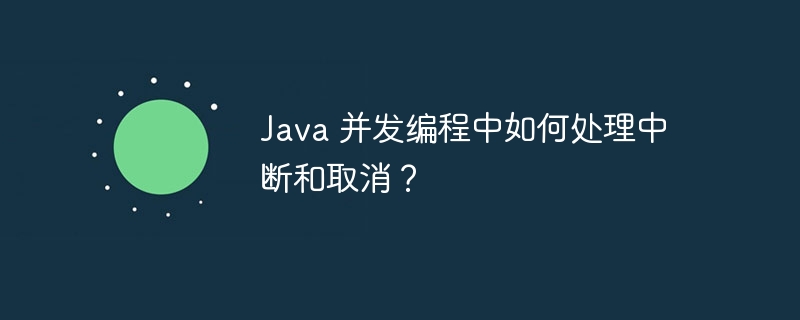How to handle interruption and cancellation in Java concurrent programming?
In Java concurrent programming, interruption and cancellation are methods used to stop tasks. Interruption is to stop the thread running immediately, which is achieved by calling Thread.interrupt(); cancellation is a collaborative process, which requires the task to explicitly check the cancellation status and respond, and is achieved by creating a cancelable task.

How to handle interruption and cancellation in Java concurrent programming
In concurrent programming, sometimes it is necessary to interrupt or cancel a task while it is in progress. Java provides two methods to handle these situations: interrupt and cancel.
Interruption
Interruption is a mechanism that allows a thread to stop executing the current task. This is typically used when a task needs to be stopped immediately, such as when the user cancels the operation or encounters an error. Threads can be interrupted by calling the Thread.interrupt() method.
// 中断线程
Thread thread = new Thread(() -> {
// 线程执行的任务
while (!Thread.currentThread().isInterrupted()) {
// 运行任务
}
});
thread.start();
// 在某些条件下中断线程
if (condition) {
thread.interrupt();
}The interrupted thread will throw InterruptedException exception. The thread can catch this exception and handle it accordingly, such as stopping the task or cleaning up the resource.
Cancellation
Cancellation is another way to stop a thread from executing the current task. Unlike interrupts, cancellation is a collaborative process that requires threads to explicitly check their cancellation status and react. Cancellation is achieved by creating a cancelable task that implements the java.util.concurrent.Future interface.
// 创建可取消任务
ExecutorService executorService = Executors.newFixedThreadPool(1);
Future<?> task = executorService.submit(() -> {
// 线程执行的任务
while (!task.isCancelled()) {
// 运行任务
}
});
// 在某些条件下取消任务
if (condition) {
task.cancel(true);
}When the task is canceled, the Future.isCancelled() method will return true. Threads can periodically check this status and stop tasks as needed.
The above is the detailed content of How to handle interruption and cancellation in Java concurrent programming?. For more information, please follow other related articles on the PHP Chinese website!

Hot AI Tools

Undresser.AI Undress
AI-powered app for creating realistic nude photos

AI Clothes Remover
Online AI tool for removing clothes from photos.

Undress AI Tool
Undress images for free

Clothoff.io
AI clothes remover

AI Hentai Generator
Generate AI Hentai for free.

Hot Article

Hot Tools

Notepad++7.3.1
Easy-to-use and free code editor

SublimeText3 Chinese version
Chinese version, very easy to use

Zend Studio 13.0.1
Powerful PHP integrated development environment

Dreamweaver CS6
Visual web development tools

SublimeText3 Mac version
God-level code editing software (SublimeText3)

Hot Topics
 Square Root in Java
Aug 30, 2024 pm 04:26 PM
Square Root in Java
Aug 30, 2024 pm 04:26 PM
Guide to Square Root in Java. Here we discuss how Square Root works in Java with example and its code implementation respectively.
 Perfect Number in Java
Aug 30, 2024 pm 04:28 PM
Perfect Number in Java
Aug 30, 2024 pm 04:28 PM
Guide to Perfect Number in Java. Here we discuss the Definition, How to check Perfect number in Java?, examples with code implementation.
 Random Number Generator in Java
Aug 30, 2024 pm 04:27 PM
Random Number Generator in Java
Aug 30, 2024 pm 04:27 PM
Guide to Random Number Generator in Java. Here we discuss Functions in Java with examples and two different Generators with ther examples.
 Armstrong Number in Java
Aug 30, 2024 pm 04:26 PM
Armstrong Number in Java
Aug 30, 2024 pm 04:26 PM
Guide to the Armstrong Number in Java. Here we discuss an introduction to Armstrong's number in java along with some of the code.
 Weka in Java
Aug 30, 2024 pm 04:28 PM
Weka in Java
Aug 30, 2024 pm 04:28 PM
Guide to Weka in Java. Here we discuss the Introduction, how to use weka java, the type of platform, and advantages with examples.
 Smith Number in Java
Aug 30, 2024 pm 04:28 PM
Smith Number in Java
Aug 30, 2024 pm 04:28 PM
Guide to Smith Number in Java. Here we discuss the Definition, How to check smith number in Java? example with code implementation.
 Java Spring Interview Questions
Aug 30, 2024 pm 04:29 PM
Java Spring Interview Questions
Aug 30, 2024 pm 04:29 PM
In this article, we have kept the most asked Java Spring Interview Questions with their detailed answers. So that you can crack the interview.
 Break or return from Java 8 stream forEach?
Feb 07, 2025 pm 12:09 PM
Break or return from Java 8 stream forEach?
Feb 07, 2025 pm 12:09 PM
Java 8 introduces the Stream API, providing a powerful and expressive way to process data collections. However, a common question when using Stream is: How to break or return from a forEach operation? Traditional loops allow for early interruption or return, but Stream's forEach method does not directly support this method. This article will explain the reasons and explore alternative methods for implementing premature termination in Stream processing systems. Further reading: Java Stream API improvements Understand Stream forEach The forEach method is a terminal operation that performs one operation on each element in the Stream. Its design intention is






